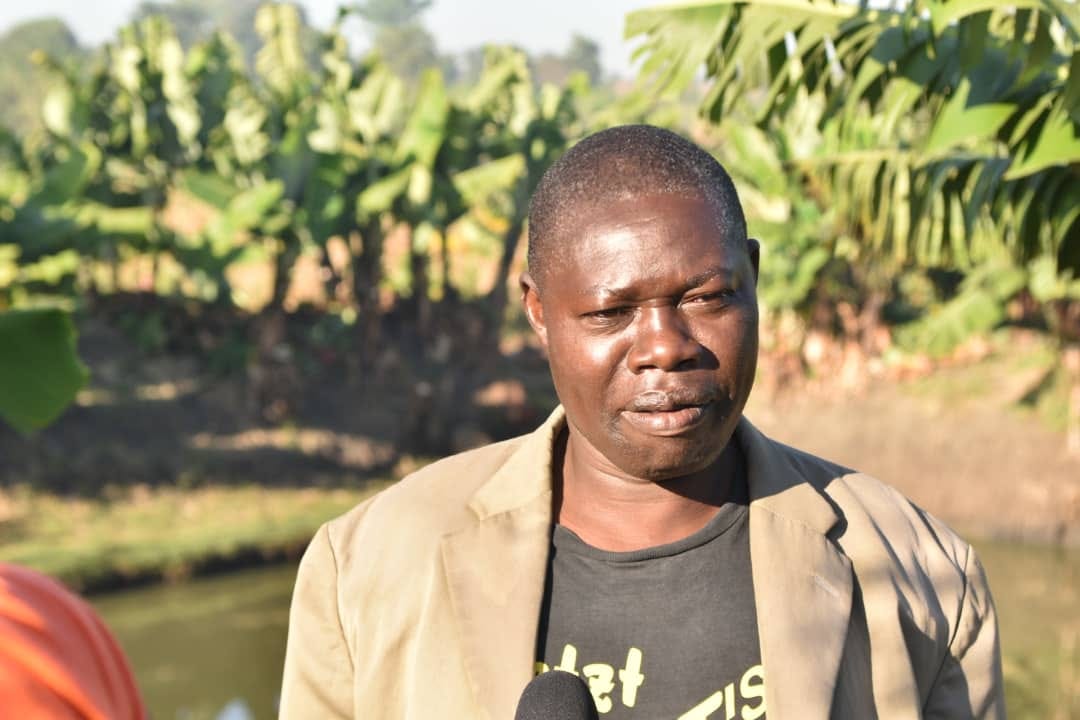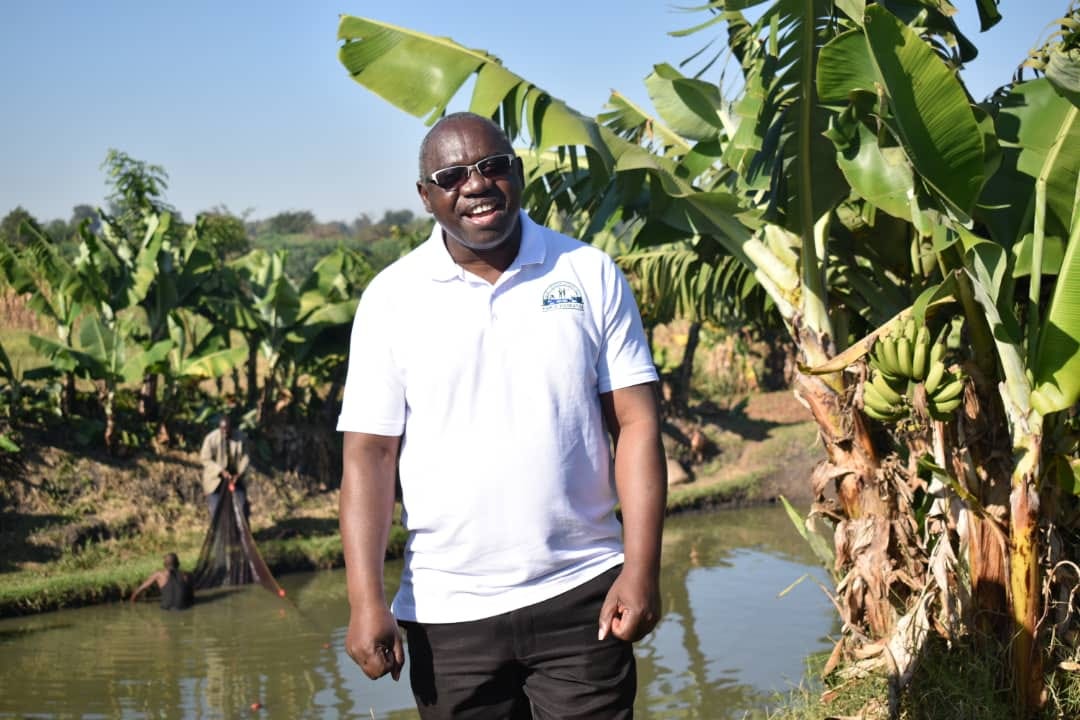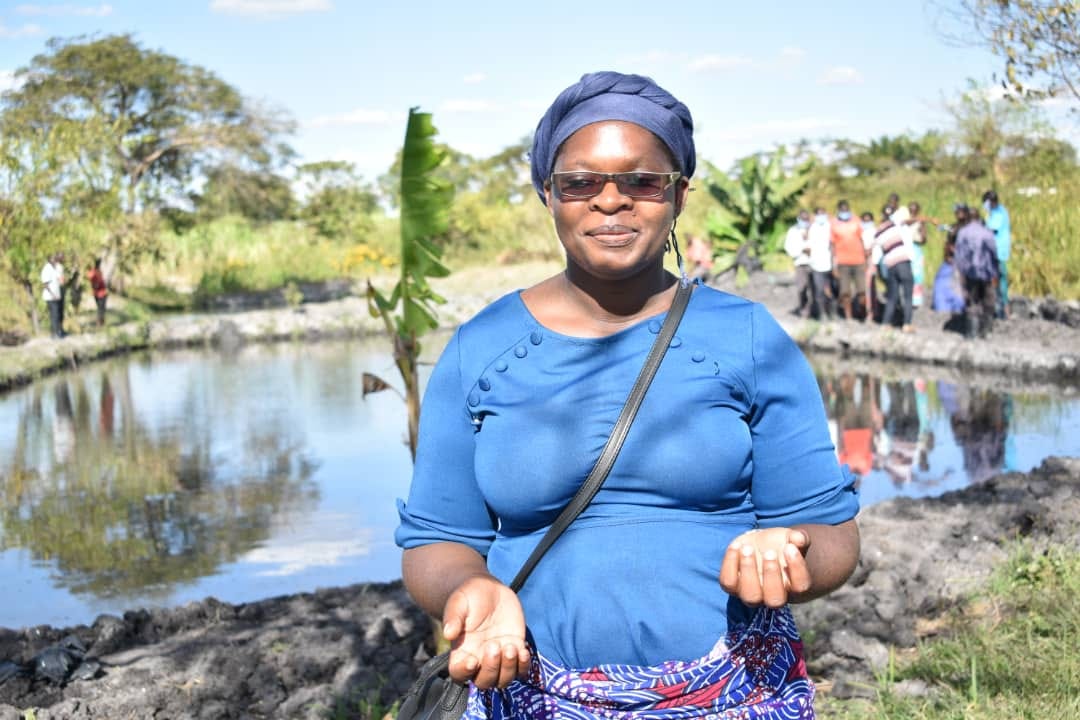Reaping fruits of fish farming
Families from nearby communities are no longer waiting for fish from Lake Malawi before they can have the protein-rich food on their plates.
Leveson Wayilosi, 50, who is also Senior Group Village Headman Matambo in Traditional Authority Chadza, had all along believed fish farming was only possible for households living close to natural water bodies.
A visit to a nearby community in Traditional Authority Chiseka in Lilongwe changed his view.
He instantly ventured into fish farming after being inspired by others who were making it big in the trade but needed more skills to sustain his endeavour.
“Now, I am a role model among farmers in my location because I received training on proper and successful fish farming.
“Established and budding fish farmers come to my ponds to buy fingerlings for their ventures. For instance, last year, I earned about K300,000 after selling the fingerlings, an amount way higher than the K72,000 I made in 2019 from selling mature fish,” Wayilosi explains.
Once every month, he catches the juvenile fish which gives him what he calls substantial amounts of money to meet other needs in his household.
He attributes the progress to an Aquaculture Value Chain (AVC) Project being implemented in Lilongwe, Mchinji, Dedza and Kasungu by Kawjo Foundation which was subcontracted by the consortium of Cofad, GOPA and Umodzi, with support from German International Cooperation (GIZ).
Wayilosi’s three fishponds, constructed on a wetland within his farmstead, are also attracting those venturing into fish farming for the first time where they learn a few things about how to manage it.
“My family, additionally, does not struggle when it comes to accessing nutritious food. Apart from consuming fish which I rear myself, we also sell some and buy other foodstuffs as we deem it necessary,” the father-of-six says.
In the meantime, he is working on increasing the number of fishponds to further boost income for his family.
The knowledge that he has acquired through the AVC project has convinced him to pay particular attention to the production of fingerlings which he says is more lucrative than that of mature fish.
“I have learnt the importance of having fish-parents with good traits and it is helping me to produce fingerlings of good standards. My customers love them,” Wayilosi explains.
Elsewhere in Mvuula Village, Traditional Authority Mkanda in Mchinji, fish farmer Jamikele Kanyenda is making remarkable profits for the first time since he started rearing the aquatic creatures in 1995.
At first, his farming techniques were very basic, he says.
“I used to grow tobacco on a big plot and could not make profits. I started fish farming but still, there wasn’t much progress until I got trained through the AVC project.
“On a small piece of land, I am getting more proceeds from fish farming than I used to when growing various kinds of crops,” Kanyenda says.
The production per unit area, he says, has been boosted following training in pond construction, fingerlings selection, choice of fish feed and assessment of available markets.
Families from nearby communities are no longer waiting for fish from Lake Malawi before they can have the protein-rich food on their plates.
“This year, I am expecting to harvest about 1,000 kilogrammes and make at least K400,000. This is an amount I could just dream about,” Kanyenda says, his face glowing with satisfaction.
The Food and Agriculture Organisation (FAO) of the United Nations (UN) says aquaculture in Malawi contributes to food security in terms of increased access, increased production, improved household capacity to acquire food and improved utilisation of farmland for production, among others.
There are persistent calls that significantly promoting and revamping aquaculture may also save forex as the country is now importing fish despite that it can produce it within its borders.
The dwindling of stocks in the country’s lakes and rivers further invites improvements in aquaculture to fill the gap in catches
“Aquaculture supplies fish to most upland areas which are not easily accessible to fish from the lakes… Malawian agriculture is dependent on rainfall from November to April, leaving the remaining months dry and idle in terms of agricultural production.
“Aquaculture enables farmers to continue producing food in those idle dry months. Fish farming also plays a crucial role in turning marginal wetlands into productive land for crop production such as vegetables,” FAO says.
The UN agency adds that in other areas, aquaculture is carried out in communal ponds and irrigated dams, thereby diversifying income through the sale of fish and the provision of nutrition to poor households.
Wayilosi’s and Kanyenda’s are among those households.
Kojo Foundation Director, Emmanuel Kaunda—who is also a Professor of Aquaculture and Fisheries Science at the Lilongwe University of Agriculture and Natural Resources (Luanar)—is pleased that their interventions are changing the lives of farmers.
“It encourages us when we see that we are making a positive impact on farmers lives through outreach initiatives. We established the foundation primarily to work with fish farmers,” Kaunda says.
He is convinced that the knowledge of experts in academia should practically help citizens in surrounding communities, adding that “science and research must have an impact on the ground”.
Kojo Project Manager, Zone Makawa Chawalika, says the non-profit organisation, whose goal is to transform the lives of vulnerable individuals, was subcontracted by a consortium of Cofad, Gopa Worldwide Consultants and Umodzi Consulting to implement two components in the AVC project.
Kojo Foundation Project Manager, Zione Makawa Chawalika, says the nonprofit organisation, whose goal is to transform the lives of vulnerable individuals, was subcontracted to support the implementation of two components A and B in the AVC project.
“Component A mainly focuses on increasing production and job opportunities from aquaculture while component B focuses on the increasing organisation of fish farmer groups into associations,” Chawalika says.
She adds that, so far, about 2670 fish farmers in the four districts have been reached with training on how to thrive in their ventures.
The AVC project is also being implemented in the Northern and Southern regions of Malawi.







